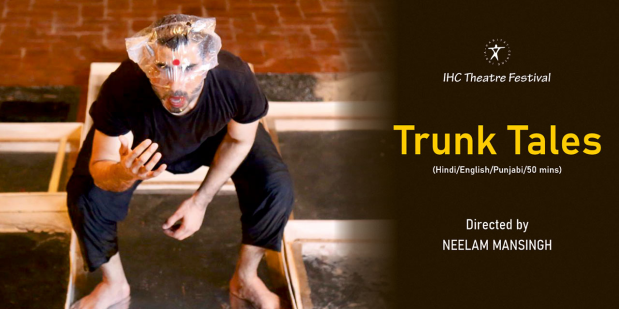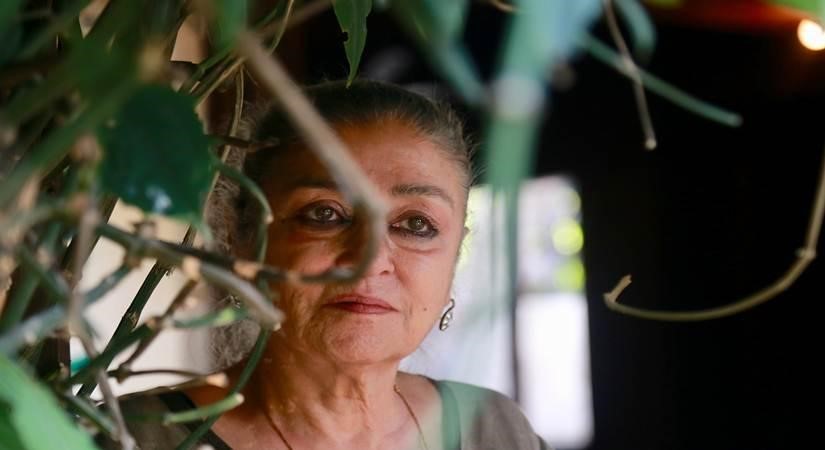‘TRUNK TALES’ lives up to Neelam Mansingh’s unique presentation style

Neelam Mansingh Choudhry is a well-known name in Hindi theatre world. A student of Ebrahim Alkazi at the National School of Drama, she has been running her group, The Company in Chandigarh since 1983. Her work always shows the high standards of production in her presentations, displaying the values inculcated by Alkazi in his students. Her plays like Kitchen Katha, Yerma, Naked Voices, Nagmandal etc. have received loud applause from the public, as well as received rave reviews from the critics. Her work has also earned her well-deserved international recognition.
Recently she brought her Hindi/English/Punjabi play ‘Trunk Tales’ to the IHC Theatre Festival in Delhi. It was a solo performance, although bearing the same old well-known mark of hers on the production. Her plays are generally based on her everyday observations and experiences of day-to-day life. She is master of creating magical moments out of the daily mundane chores of household. Remember the childhood games… ‘Akkad bakkad bambe bo assi nabbe poore sau…’, or ‘Machhli jal ki rani hai…’? That innocence of the childhood was present on the stage in this play… the innocence, which remains with us through our life-time, but which also becomes the ‘other’ thing of our life as we grow old!
A non-scripted performance piece, the play ‘Trunk Tales’ revolved around telling stories in a Dadi-Nani style, bringing out stories out of their ‘potlis’… only that, here, the ‘potlis’ have been replaced in this play by four trunks kept on the stage. Stories tumble out of these trunks one by one, bringing us face to face with that ‘otherness’ in life. The point she wanted to stress upon was that we generally live within certain boundaries, as per the set rules of behaviour. Anything not conforming to these sets of rules creates a sense that the person going beyond these boundaries of rules is not one of us… he is the ‘other’ person in the society. She takes support of poems, childhood stories and little play-songs, small episodes, some memories for presenting her ‘non-linear’ stories, to tell about the people who don’t really fit in,” she said to someone in an interview.
These stories strived to present the ‘otherness’ in life… stories on politics of water, body-abuse including rape and child abuse representing no control on one’s own body, hunger, and finally trans-gender behaviour… It is difficult to present the ‘otherness’ in gender in a palatable way, but Vansh Bhardwaj deserves applause for performing this difficult task so well… he knows how to use his body on the stage. “I had to develop different body languages and understand the psychology of the characters.” Vansh said in an interview some time ago! I have seen Swatilekha Sengupta performing a full two and a half hours long solo ‘Shanu Roychoudhury’ on this very stage many many years ago. I hope to watch Vansh repeat that wonder some time, under the direction of Neelam Mansingh Choudhry sometime in future.

In ‘Trunk Tales’, she had kept a few trays filled with water on the floor of the stage. With water, she wanted to present an essential element of life, which has a flexible nature, a fluidity, and gets easily moulded to take any shape. Water worked as the element of life represented in the stories told by the actor on the stage, who presented stories full of vigour and vibrancy of every daily life! Keeping the sets to a minimal is her known style as well as the need of the hour in today’s constrained situations as far as presenting a play in an auditorium is concerned. Keeping the sets to a minimal also helps her create the ambience through the props and the activities of her actors on the stage.
She has done a play ‘Kitchen Katha’ on the theme of fire (although she concedes that the theme of fire was not on her mind when she did ‘Kitchen Katha’, neither was water on her mind while doing this play). Now she has done a play with water as its theme. We hope she comes out with the remaining three elements of life, earth, air and pran!
The thing that we missed the most in this play was live music by the folk singers of Punjab, her famous hallmark. She has done a lot in the past to revive Punjab’s folk music, which had suffered a severe blow in the troubled times of Khalistani terrorism in Punjab in the eighties of the twentieth century. She tells that it is Corona to be blamed for missing on music… our theatre-persons have not been able to come out of the after-effects of Corona still. She avers, “we are still coming out of the effects of Corona, and it will take some time before we can come back to our own basics”.
Best thing about her plays is that she does not try to make them a make-believe world… she actually brings the reality to the auditorium. Some of you might have enjoyed hot jalebis prepared by the ‘halwai’ in the auditorium itself while watching her play ‘Kitchen Katha’! Alas, the jalebis did not reach me, as I was sitting in the sixth-seventh row on that day! She had taken inspiration from her childhood impressions of the tradition of ‘langar’ in Punjab for ‘Kitchen Katha’, where community cooking used to take place. In ‘Trunk Tales’ also, Vansh has a thali full of real food, and enjoying it actually on the stage, instead of empty thalis, cups and glasses, through which the directors ask the actors to pretend eating or drinking … this adherence to ‘reality’ makes Neelam’s plays a REAL treat for the eyes!
She plans to do Girish Karnad’s Hayavadana in Hindi coming February. It is being planned to be done on a big scale. She avers that the actors from across the country will be a part of this production. She is using Karanth’s translation for this production, although with some new insights into the play, keeping in mind the sensibilities of the modern times.

On the issue of the trends in play-writing these days, she does feel that more new plays are needed with newer sensibilities in mind. She feels that there should be deeper connection between the writer and director while developing new plays. Making one’s own script by the director, in collaboration with the actor/s, is a new trend according to her, although it is not new… it has always been resorted to by the directors and writers. She quoted the making of Mohan Rakesh’s plays by Alkazi, and also pasting of the new plays on the walls of Paris by Moliere, to solicit the response from the public directly during the writing of the play!